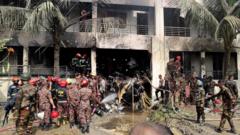The interim government in Bangladesh has announced a ban on all activities of the Awami League, the party of former Prime Minister Sheikh Hasina. This measure, enacted under the anti-terrorism law, is seen as a response to the party's alleged involvement in violent incidents during protests. The legal restrictions are aimed at holding the entire party accountable as legal proceedings unfold, marking a significant shift in the political landscape of the nation.
Bangladesh Enacts Ban on Awami League Amid Ongoing Political Turmoil

Bangladesh Enacts Ban on Awami League Amid Ongoing Political Turmoil
The interim government of Bangladesh has officially prohibited the activities of the Awami League party, led by ousted former Prime Minister Sheikh Hasina, in a decisive move reflecting the ongoing repercussions of last year’s mass protests.
The interim government of Bangladesh took a significant step on Saturday by declaring a ban on the Awami League, the political party previously led by ousted Prime Minister Sheikh Hasina. This decision, made under the country's anti-terrorism act, comes as the nation continues to grapple with the aftermath of a massive student-led uprising that resulted in Hasina's flight from the country last summer.
The government, now headed by Nobel Peace Prize laureate Muhammad Yunus, has also amended existing legislation to enable the prosecution of entire political parties for crimes committed by their members, rather than just focusing on individual culpability. This move underscores a commitment to increasing accountability in the face of political violence and civil unrest.
Emerging from last year’s turmoil, the Awami League has had a lingering presence, despite Hasina's departure to India following widespread protests. Recently, tensions flared again after the alleged assault on Hasnat Abdullah, a prominent leader of the student uprising, which led to accusations against the Awami League and intensified public calls for their prohibition.
During a protest held on Saturday, Abdullah stated, “Our ultimate goal is to see that the Awami League is banned. Don’t leave the streets until the Awami League is banned.” The rally saw participation from various groups, including injured students and representatives from other political factions supportive of the protestors' demands.
In an official announcement, Law Minister Asif Nazrul confirmed the suspension of Awami League activities, emphasizing that the ban would remain in effect until the International Crimes Tribunal concludes its trials against the party and its leaders for alleged atrocities connected to last year’s demonstrations.
A report from an inquiry commission claimed that under Hasina's administration, a series of state-sponsored disappearances occurred, with a United Nations investigation citing that law enforcement and party affiliates were responsible for the deaths of over 1,400 individuals, including children, during the 2024 protests.
In a pointed response, the Awami League criticized the interim government's legitimacy, stating that “decisions of an illegitimate government are also illegitimate themselves.” The rapid emergence of student protests last year revolved around discontent over job reservation systems but escalated into a widespread call for political accountability after a protestor's death in July prompted a severe crackdown by the government, including internet restrictions and enforced curfews.
After fleeing the country on August 5, 2024, Hasina's administration became vulnerable. Yunus was then sworn in as the new leader three days later, marking a crucial turning point in Bangladesh’s political narrative. The unfolding legal battles and the fate of the Awami League now remain pivotal issues shaping the future of governance in Bangladesh.


















